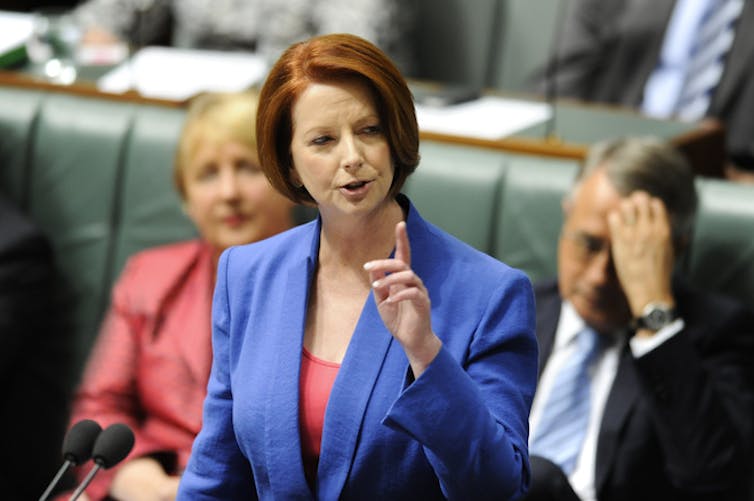Germaine Greer once wrote that women have no idea how much men hate them. Thanks to the internet, now we do. - @PennyRed
Since the 1990s, some social commentators have declared that we live in a post-feminist era where gender equality has been achieved. Some have even suggested that “the pendulum has swung too far” and now men and boys are disadvantaged compared with women and girls (the 2002 Australian Senate inquiry into boys’ education is one example). This couldn’t be further from the truth.
Caroline Criado-Perez, a British journalist, has been the latest victim of vitriolic online abuse, including graphic death and rape threats, following her seemingly innocuous campaign for women’s representation was successful in getting Jane Austen to appear on the UK £10 banknotes.
UK Labour MP Stella Creasy, who had also supported the banknote campaign, received similar messages. Such harassment has been seen repeatedly on blogs such as Feministing, Jezebel and Destroy the Joint, where bloggers and moderators report deleting hundreds or thousands of emails and posts daily.
Overt and old-fashioned sexism is now considered taboo - so much so that there is a reluctance even to acknowledge any behaviour as potentially sexist. This was evident in responses to former prime minister Julia Gillard’s sexism and misogyny speech, particularly in the mainstream media. Gillard herself was subject to some overtly sexist behaviour, but many excused this as merely the cut and thrust of politics, and no different to teasing male politicians.
The social media responses to Gillard’s speech, though, did suggest that the experience of sexism is one that resonates with women not only in Australia but around the world.
Ironically, it has been women campaigning for women’s issues, particularly online, who have exposed what was considered old-fashioned sexism and outright misogyny.
Twitter and blog comments provide some public exposure of this abuse, but much is directed at private email addresses, and moderation of comments often results in removal. Prominent UK feminist writer Laurie Penny has been repeatedly targeted with the online publishing of a home address thought to be hers, seemingly so trolls could make good on their rape and death threats against her.

Rather than sticking with the commonly advocated refrain of “don’t feed the trolls”, women (and other minority groups) are starting to bite back against this online abuse. Increasingly, bloggers are calling on women to sink to the level of misogynists and out their attackers.
An abusive email sent to Feministing from a university student email address - which just happened to belong to the public relations officer for the Republican club of Southern Illinois University College in the US - is just one example. He was outed and various faculty members were contacted by blog supporters. As a result, he was removed from the Republican club and made a public apology on the blog comments (although this was more of a “sorry to have been caught” than a “sorry I did it”).
Criado-Perez and Creasy’s treatment has resulted in the arrest of one man on harassment charges and forced Twitter to address the way abusive tweets are reported.
A recent campaign targeting Facebook resulted in a commitment from them to address gender hate as strictly as other forms on their site.
So what does this online confrontation of misogyny mean for everyday instances of sexism? It is no doubt confronting for individuals, especially women, to face such virulent evidence of gender hate. In the past this may have been explained as a one-off occurrence carried out by damaged or ignorant individuals (the misogynist, the sexist).
Does the sheer scale of the issue point strongly to culture? Does the internet, through its possibilities of anonymity and instant response, merely expose an underlying, socially-shared hatred of women, as suggested by Germaine Greer and Penny Red in the above tweet? While many agree that institutions such as the Australian Defence Force have a sexist culture, are commentators willing to admit it’s more widespread?
When confronted with sexism, research shows women rarely speak out, especially when they are the target. Sometimes they fear reprisals, particularly in positions of unequal status (such as job interviews),or being perceived as whiny or as “playing the gender card”. Such reactions were clearly evident in media responses to Gillard’s speech.
Perhaps this explicit confrontation of misogyny will make women more comfortable challenging the more subtle forms of sexism and raise awareness of these. However, some of these reactions, claiming that any attempt to address abuse on Twitter or other social media is censorship that inhibits free speech suggests there is still a long way to go.

